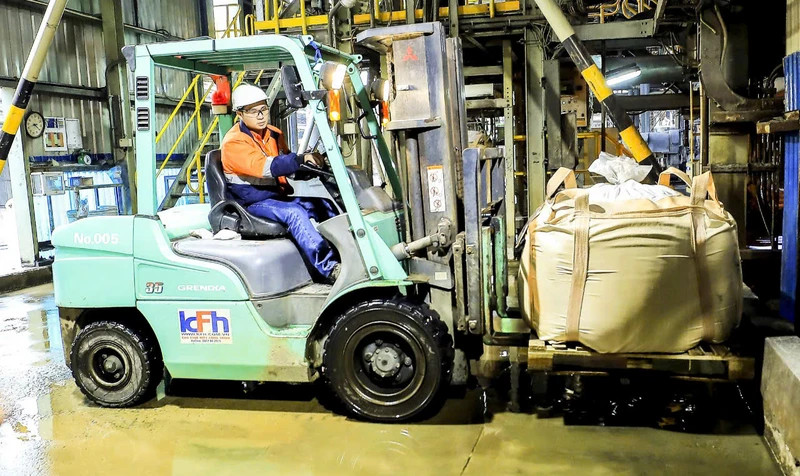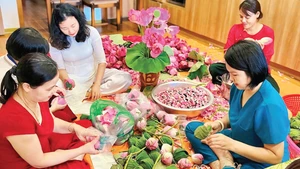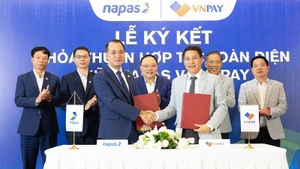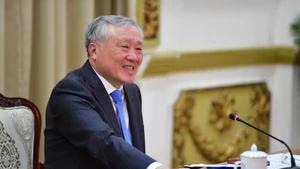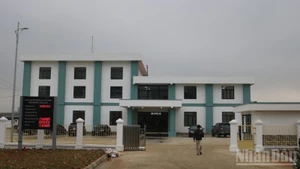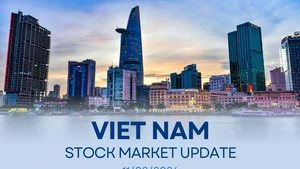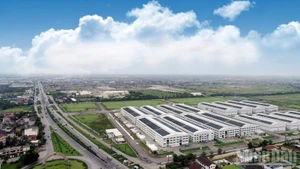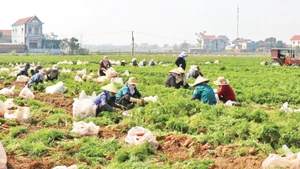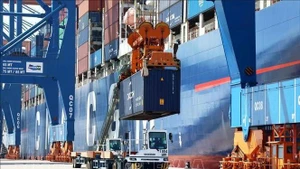Reducing reliance on a single market
Thai Nguyen’s industrial zones currently host 184 foreign direct investment (FDI) projects with a total capital of over 10.8 billion USD, alongside 141 domestic investment projects with nearly 27 trillion VND (1.04 billion USD) in capital. Among these, 92 projects focus on manufacturing export goods, contributing over 8 billion USD in the first quarter of 2025—accounting for approximately 94% of total export value. Key export products include mobile phones, computers, electronic components, textiles, and wood products, with the US market making up 22.4% of the total value.
While the US has temporarily suspended the imposition of a 46% reciprocal tariff for 90 days pending negotiations, enterprises in Thai Nguyen have intensified exports to the US market and taken adaptive measures to diversify their market reach.
Nguyen Dinh Viet, Deputy Head of the Thai Nguyen Industrial Zone Management Board, stated: “Samsung Group in Thai Nguyen exports goods worth about 25 billion USD annually, with roughly 24% destined for the US. Facing the risk of high US tariffs, Samsung has recently ramped up exports of mobile phones and tablets to European and Middle Eastern markets. Simultaneously, the group is continuing construction of a semiconductor manufacturing plant in Yen Binh Industrial Park, Thai Nguyen, with a total investment exceeding 900 million USD.”
Each year, Thai Nguyen’s textile industry exports goods worth over 500 million USD, with TNG Investment and Trading Joint Stock Company (TNG) accounting for the largest share—approximately 70%, including around 26% to the US market.
Nguyen Van Thoi, Chairman of the Board of Directors of TNG, said: “We are not concerned about the possibility of high tariffs on textile goods in the US because TNG-branded products have established credibility there. If high reciprocal tariffs are imposed, we and our US partners will agree to share the risk by reducing profit margins.
To remain competitive, we continue investing in technological innovation to cut costs and boost productivity while expanding exports to the markets of Europe, Japan, the Republic of Korea, and Australia.
From April 2025 to the present, TNG’s export revenue has shown solid growth, with average worker salaries maintained at 9.5 million VND per person. By the end of 2025, we plan to recruit an additional 1,000 workers, bringing our total workforce to 20,000.”
According to Nguyen Dinh Viet, the Thai Nguyen Industrial Zone Management Board has recently intensified and will continue efforts to disseminate information and provide guidance on leveraging benefits from Free Trade Agreements (FTAs) to support market diversification and reduce overdependence on any single export market.
Proactively turning risk into opportunity
The 90-day window during which the US has suspended the reciprocal tariff is not only a chance to boost exports to this market but also an opportunity for Thai Nguyen businesses to proactively adapt. Minh Bach Co., Ltd., located in Song Cong I Industrial Zone, which specialises in manufacturing and exporting counterbalance equipment for forklifts to the US, was forced to halt exports when the 46% tariff was initially announced.
However, once the temporary suspension was declared, US partners promptly resumed transactions, allowing the company to restart production. According to Minh Bach’s leadership, the firm is currently negotiating with new partners in alternative markets to ensure resilience if the US reimposes high tariffs.
Dung Chung Trading and Wood Processing Co., Ltd., which previously only exported to the US, has recently expanded into the Australian and Thai markets. This strategic shift opens up long-term prospects for wood and wood product exports and reduces dependence on the US.
Many businesses have negotiated with US partners to either accelerate delivery schedules or adjust pricing structures to help share the burden of potential new tariffs. TDT Investment and Development Joint Stock Company, a textile exporter with 2,600 workers and 20% of its exports heading to the US, has secured orders through the end of August 2025, with commitments from US clients to maintain their contracts, ensuring stable production.
Nguyen Van Thoi, Chairman of TNG, noted: “If the US imposes higher tariffs on textile products from China, Chinese factories producing raw materials and accessories may relocate to Viet Nam. This would allow our textile sector to access cheaper inputs, thanks to reduced transportation and labour costs. Combined with significant room for technological upgrades, lower production costs will create larger export opportunities for Vietnamese textile companies.”
China’s restriction on rare metal exports has led to global shortages and price hikes. Since these metals are not subject to reciprocal tariffs, Vietnamese-produced tungsten, bismuth, and fluorspar enjoy a significant advantage.
Masan High-Tech Materials, which operates the largest polymetallic mine and tungsten, bismuth, and fluorspar refining plant in Thai Nguyen, is actively capitalising on this opportunity by ramping up production and exports to supply the aerospace, aviation, electronics, and automotive industries globally.
In the face of global trade turbulence, Thai Nguyen Province and its export manufacturing enterprises are working to turn risks into opportunities by enhancing transparency in production records and processes, reducing reliance on a single export market, and expanding market share in the EU, Japan, the Republic of Korea, and the Middle East.
Simultaneously, businesses are promoting localisation to lessen dependence on imported materials, investing in technology and automation to raise productivity, cut costs, and improve product quality and competitiveness.
